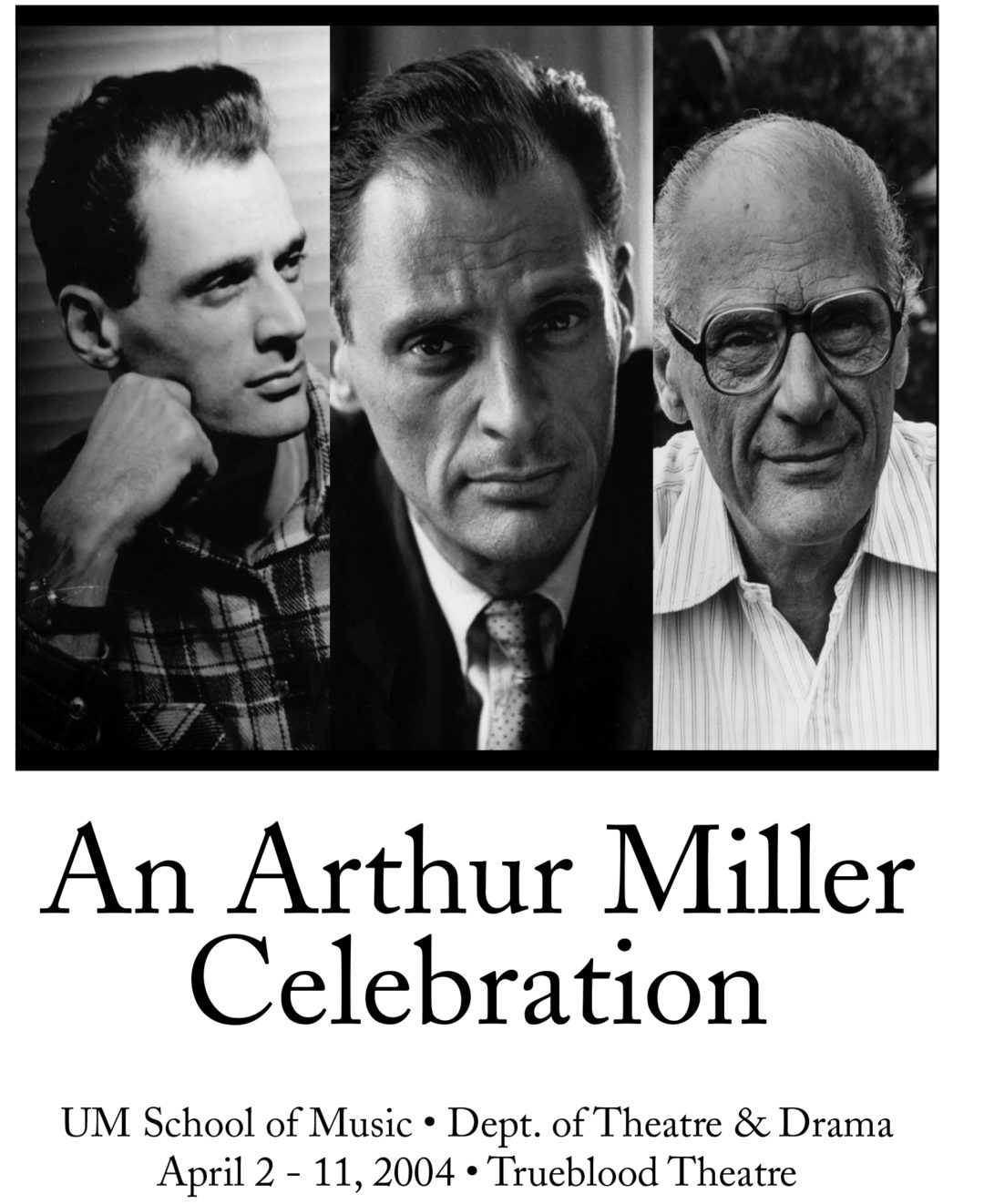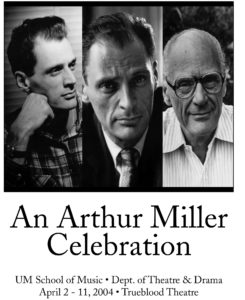An Arthur Miller Celebration
Selections from the works of Arthur Miller
Conceived by Mark Lamos
Department of Theatre & Drama
April 2-11, 2004 • Trueblood Theatre
Pulling scenes from both well-known and rarely performed works by Arthur Miller, this production highlights the depth of work which Miller has contributed to the American and world stage. It explores three distinct influences on Miller’s writing: the Great Depression, love, and persecution – both politically and religiously based. The play contains scenes or monologues from twelve of Miller’s works – All My Sons (1947), Death of a Salesman (1949), The Crucible (1953), A View From the Bridge (1956), After the Fall (1964), Incident at Vichy (1964), The Creation of the World and Other Business (1972), The American Clock (1980), A Memory of Two Mondays (1984), Broken Glass (1994), Mr. Peter’s Connections (1999), and Resurrection Blues (2002) – interspersed with interludes taken from his autobiography Timebends: A Life which was written in 1987.
Arthur Miller once told Mel Gussow of The New York Times that his wish for his legacy was to have written “some good parts for actors.” For more than half a century Miller has stood as one of America’s quintessential playwrights. He has received countless awards for his contributions to the theatre, including four Tony Awards, including a special award for Lifetime Achievement, an Obie Award, an Olivier Award, the George Foster Peabody Award, the Kennedy Center Honors Lifetime Achievement Award, the Lucille Lortel Lifetime Achievement Award, and a Drama Desk Award for Lifetime Achievement.
Artistic Staff
Concept: Mark Lamos
Director/Script Supervision: D. Ross
Directors: Julia Bochnowski, Clark Johnson, Esther Neff
Scenic & Lighting Designer: Janine L. Woods
Costume Designer: Jessica Hahn
Composer: Katie Kring
Stage Manager: Margo Brenner
Cast/Scenes
Transition scenes taken from Arthur Miller’s autobiography Timebends: A Life, 1987.
Ensemble: Chris Allen, Alexandra Bogorad, Adam H. Caplan, Leigh Feldpausch, Joanna Fetter, Brad Fraizer, Sari Goldberg, De’Lon Grant, Anika Habermas-Scher, Anna Heinl, Elizabeth Hoyt, J. Theo Klose, Kevin Kuczek, Aubrey Levy, Brian Luskey, Malaika A. Nelson, Maureen Sebastian, Christopher Shand, JoAnna Spanos, Kathryn Thomas, James Wolk, Paul Wyatt
Part I: The Depression
After the Fall, 1964
Quentin: De’Lon Grant
The American Clock, 1980
Rose: Joanna Fetter
A Memory of Two Mondays, 1955
Kenneth: Kevin Kuczek
Bert: Chris Allen
The American Clock, 1980
Irene: Malaika A. Nelson
All My Sons, 1947
Mother (Kate): Leigh Feldpausch
Ann: Maureen Sebastian
Death of a Salesman, 1949
Linda: Malaika A. Nelson
Part II: Love and Romance
After the Fall, 1964
Maggie: Elizabeth Hoyt
Quentin: De’Lon Grant
Man: Aubrey Levy
Mr. Peters’ Connections, 1998
Charlotte: Joanna Fetter
A View From the Bridge, 1955
Eddie: J. Theo Klose
Beatrice: Kathryn Thomas
Catherine: Anika Habermas-Scher
The American Clock, 1980
Lee: Christopher Shand
Edie: Anna Heinl
Joe: Brad Fraizer
Isabel: JoAnna Spanos
The Creation of the World and Other Business, 1972
Adam: Paul Wyatt
Eve: Sari Goldberg
Part III: Persecution
After the Fall, 1964
Holga: Anika Habermas-Scher
Incident At Vichy, 1964
Leduc, a doctor: Brad Fraizer
Lebeau, a painter: Aubrey Levy
Monceau, an actor: Brian Luskey
Von Berg, a prince: Adam H. Caplan
Boy: Christopher Shand
Broken Glass, 1993
Sylvia: Alexandra Bogorad
Dr. Hyman: Adam H. Caplan
The Crucible, 1953
John Proctor: Brian Luskey
Mercy: Leigh Feldpausch
Danforth: Aubrey Levy
Abigail: Maureen Sebastian
Mary Warren: Joanna Spanos
Rev. Hale: Paul Wyatt
Rev. Parris: Chris Allen
Susanna: Anika Habermas-Scher
Resurrection Blues, 2002
Skip Cheeseboro: James Wolk
Henri Schultz: J. Theo Klose
Resources
[accordion title=”Notes on An Arthur Miller Celebration”]
In Chekhov’s play The Seagull, the young playwright Treplev says, “We need new forms!” And in his long and distinguished career, Arthur Miller’s work has never settled for the obvious. His work continually seeks new ground, and he keeps surprising his critics and audiences, remaining restlessly and surprisingly evergreen. It is decidedly inappropriate to label his work as naturalistic, since one of his earliest and most famous plays, Death of a Salesman, was ground-breaking in a dream-like, expressionistic way – shards of naturalism refracted by memory’s agony.
The works of Ibsen and the Greek dramatists – always shockingly new themselves when explored in creative productions – inspired Miller in his early work, yet with each play he has been a tireless experimenter with form and content. This questing spirit has occasionally kept his work from being understood in its own time and his own country, where his audience was often limited by the expectations and commercial profile of Broadway. Yet even there he continually burst the bonds that constrained other playwrights, and bravely followed his own path, politically, morally, spiritually, and artistically.
This celebration of his work includes moments from many corners of his monumental vision of America – from the Depression, which shaped his essential view of men and the world – to the present. Themes of memory, the Holocaust, responsibility and self-examination, as well as ethical and moral dilemmas simply unattempted by other dramatists, have proven to be Miller’s bread and butter in play after play. He has kept us spellbound dramatically while forcing us to look at the world as moralists. Many are filled – this is always a surprise, somehow – with deft comic moments as well as shattering tragedy. A vast array of characters – men, women, children – have filled the stages of his world with life and truthfulness.
The directors and I have chosen work that gives some impression of the spectacularly variegated textures and palettes this singular American master has delivered to the stage – and to our consciousness.
— Mark Lamos
[/accordion]


